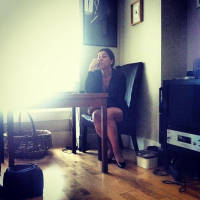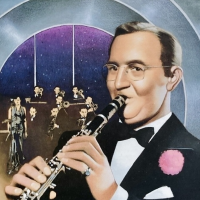Home » Jazz Musicians » Joe Williams
Joe Williams

Singing a mixture of blues, ballads, popular songs, and jazz standards, Joe Williams was an elegant and sophisticated baritone known for his clear pronunciation and jazz styling. His name may not as well known to the general public as it should be, but Joe Williams is nevertheless counted among the masters of jazz and blues singing; he has, in fact, earned the title "Emperor of the Blues." His singing style, which he developed over a long and consistently successful career, contributed to the success of the Count Basie Orchestra and influenced the style of many younger singers.
Joseph Goreed was born in the small farming town of Cordele, Georgia, on December 12, 1918. His father vanished when Williams was very young, His mother, who was no older than 18 when she gave birth to her only child, provided a strong emotional bond until her death in 1968.
Soon after Williams was born, his mother moved them in with his grandparents, who had enough money to support an extended family. During this time, she was saving up for a move to Chicago, Illinois. Once she had made the move alone, she began saving the money that she earned so that her family could join her. By the time Williams was four, he and his grandmother and his aunt were on a train to Chicago, where they would live for many years.
What became most essential to Williams's life was the music scene that thrived in Chicago in the early 1920s. Years later, he recalled going to the Vendome Theatre with his mother to hear Louis Armstrong play his trumpet. Chicago also offered a host of radio stations that featured the then rebellious sound of jazz, exposing Williams to the styling of Duke Ellington, Ethel Waters, Cab Calloway, Joe Turner, and others. By his early teens, he had already taught himself to play piano and had formed a quartet, known as the Jubilee Boys that sang at church functions.
In his mid-teens, Williams began singing solo at formal events with local bands. The most that he ever took home was five dollars a night, but that was enough to convince his family that he could make a living at it. At the age of 16, Williams dropped out of school. After a family conference, the name "Williams" was chosen as a better last name for a singer, and he began marketing himself in earnest to Chicago clubs and bands. His first job was at a club called Kitty Davis's. Hired to clean the bathrooms, Williams was allowed to sing with the band in the evening and keep the tips, which would sometimes amount to 20 dollars a night.
Read moreTags
Uncle Bill's Storytime

by H William Stine
Two hours of arguably the best of the best singers. I'd also argue that they are among the best of the best storytellers, too. This week was all about finding singers and songs that tell a story. That's my story and I'm sticking to it. Playlist Cody Owen Stine “Paris Mismatch (Theme Music)" from Unreleased Master (Self Produced) 00:00 Jeff Hall “Never Never Land" from Life: Collected (CD Baby) 02:16 Cynthia Bane “Itsy Bitsy Blues" from Clearly ...
Continue ReadingWhat We Need Are Hearts On Fire

by Mary Foster Conklin
Sample sweet holiday music from Beegie Adair, plus new releases by pianists Harold Mabern and Sue Palmer, with birthday shout outs to Diane Schuur, Frank Sinatra, Joe Williams (celebrating his centennial this year), Jazz Master Bob Dorough, Cassandra Wilson and lyricist Morgan Ames, among others. Playlist Gordon Goodwin Big Phat Band “The Little Drummer Boy" from Wrap This! A Big Phat Christmas (Music of Content) 00:00 Kurt Elling “We Three Kings from" The Beautiful Day (Sony Masterworks) 06:44 ...
Continue ReadingJoe Williams: Music for Lovers

by Chris M. Slawecki
Joe Williams' Music for Lovers comes closer to the cocktail sophistication of Nat King Cole or Billy Eckstine than to any blues jump or shout to which Williams gave joyous voice as vocalist with the Count Basie Band.
Perhaps the best part of this material, drawn from Williams' 1959-63 ballad albums for Roulette Records, is hearing his profound, inexhaustible voice keeping quiet company with fellow Basie alumni Harry “Sweets Edison (trumpet), Ben Webster (tenor saxophone), and rhythmist Freddie ...
Continue ReadingJoe Williams featuring Ben Webster: Havin' a Good Time

by AAJ Staff
By Ted Kane
Over the years, I've come to be a bit skeptical of the “discovered" or “lost classic" type of record release. You know, the kind where the historical significance is trumpeted and the sound quality is at a subbootleg level. Most of the time, that stuff languished in a vault for a reason all those years. Still, when I heard about Havin' a Good Time, the only known pairing of the great jazz/blues singer and Basie ...
Continue ReadingJoe Williams: A Man Ain

by Jim Santella
Sorely missed since his passing last year, Joe Williams set a mark for high standards that few are willing to follow. Only a handful of male jazz singers hang on to that valuable tradition today. Known for his definitive performance of the blues, Williams captured the hearts and minds of a broad audience. As a big band singer, he brought perfection to the stage. Throughout his 60-year career, he explored many different aspects of the jazz and blues world. This ...
Continue ReadingJoe Williams: A Man Ain't Supposed To Cry

by AAJ Staff
When Joe Williams passed away in March of 1999 while walking home in Las Vegas, he of course was acknowledged as one of the greatest vocalists in jazz. Legions of jazz musicians enjoyed performing with him and admired the way he crafted a song, not to mention the way he knew how to add character to a big band with the sound of his voice. Nancy Wilson's respect overflowed when she interviewed him on Nancy Wilson's Jazz Profiles. A concert ...
Continue ReadingJoe Williams: Nothin' But The Blues

by Ed Kopp
I was bummed after hearing of Joe Williams' death in early April. A sophisticated big band singer best known for his work with Count Basie, Williams was also an admirer of the great blues shouter Joe Turner. Williams tackles some Turner-style material on this 1983 CD featuring Jack McDuff (organ), Red Holloway (tenor sax), Eddie Cleanhead Vinson (sax and vocals), Phil Upchurch (guitar) and Ray Brown (bass). These veteran soul-jazzers swing out in soulful fashion and inspire some of the ...
Continue ReadingThis Week On Riverwalk Jazz: Doc Cheatham, Bob Haggart And Joe Williams

Source:
Don Mopsick
This week on Riverwalk Jazz: Doc Cheatham, Bob Haggart and Joe Williams share their music and stories with The Jim Cullum Jazz Band. The program is distributed in the US by Public Radio International, on Sirius/XM satellite radio and can be streamed on-demand from the Riverwalk Jazz website. You can also drop in on a continuous stream of shows at the Stanford Archive of Recorded Sound. Adophus “Doc” Cheatham (1905-1997) was a walking encyclopedia of jazz history. He rubbed shoulders ...
read more
Joe Williams / Ben Webster Live Recording 'Havin' A Good Time' on HYENA

Source:
All About Jazz
New York, NY -- On February 22, 2005, HYENA Records will release Havin' A Good Time!, a recently discovered nightclub performance capturing the legendary jazz vocalist Joe Williams joined by the equally legendary jazz tenor saxophonist Ben Webster. This will be the first time the historic concert has ever been commercially released. It's also the only known recording of the two jazz icons performing together “live" in a club setting. The meeting occurred in February 1964 at the Providence, Rhode ...
read more
15th Annual Joe Williams Music Scholarship Fundraiser Introduces Victor Field to Las Vegas Community

Source:
All About Jazz


















































